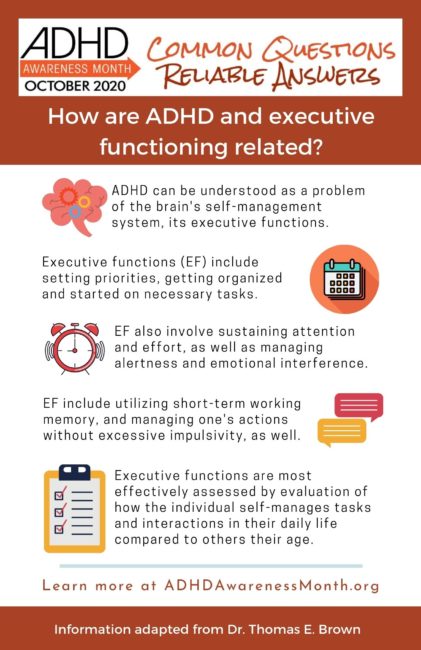For decades ADHD was seen as just a problem of little kids who couldn’t sit still, wouldn’t shut up, and were driving parents and teachers nuts. Increasingly now ADHD is being understood as a problem of the brain’s self-management system, its “executive functions” which affects not just little kids, but also many teenagers and adults.
Executive functions involve getting organized and started on necessary tasks, sustaining focus and effort for work, managing alertness and emotional interference, utilizing short-term working memory, and managing one’s actions without excessive impulsivity. These executive functions are most effectively assessed not by neuropsychological tests, but by careful evaluation of how the child or adult self-manages tasks and interactions of everyday life compared to others of similar age.
About the Author

Thomas E. Brown earned his Ph.D. in Clinical Psychology at Yale University and served on the Yale faculty for 25 years. He is now Director of the Brown Clinic for Attention and Related Disorders in Manhattan Beach, CA, is an elected Fellow of the American Psychological Association, and has published numerous articles and six books on ADHD. His website is www.BrownADHDclinic.com
References
Silverstein, MJ, Faraone, SV, Leon, TL, et al. (2020) Relationship Between Executive Function Deficits and DSM-5 Defined ADHD Symptoms. J of Attention Disorders 24 (1) 41-51
Brown, TE (2006) Executive functions and attention deficit hyperactivity disorder: implications of two conflicting views. International J of Disability, Development and Education. 53 (35-46).
Barkley, RA & Fischer M (2011) Predicting impairments in major life activities and occupational functioning in hyperactive children as adults: Self-reported executive function (EF) deficits versus EF tests. Developmental Neuropsychology 36 (137-161).
Willcutt, EG, Doyle, AE, Nigg, JT, et al. (2005) Validity of the Executive Function Theory of ADHD: A Meta-Analytic Review. Biological Psychiatry 57: 1336-1346.

